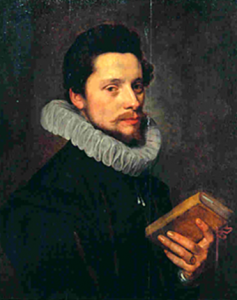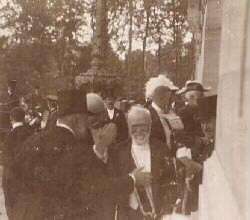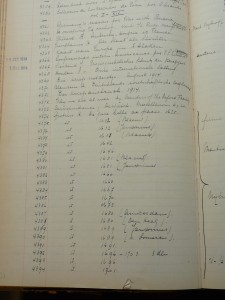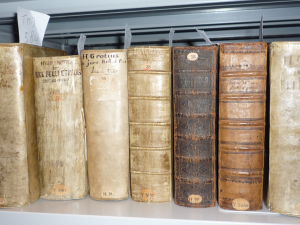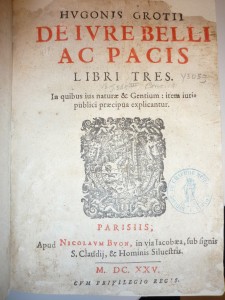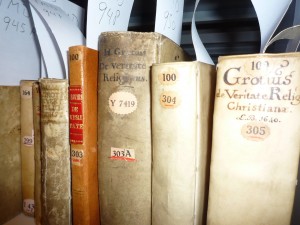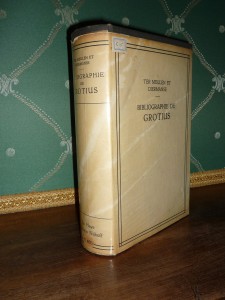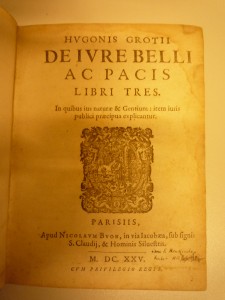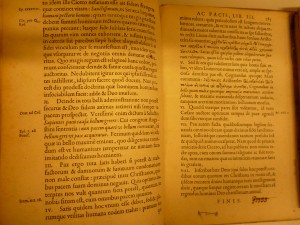Hugo Grotius’ “De Iure Belli ac Pacis”/“On the Law of War and Peace” in the History of International Law Collection of the Peace Palace Library, The Hague, The Netherlands
Inauguration
of the Peace Palace and Donation of the Hugo Grotius Titles to the Library
The Peace Palace was inaugurated on August 28th, 1913. The Permanent Court of Arbitration, established during the First Hague Peace Conference of 1899, obtained its premises. The American-Scottish industrialist and philanthropist Andrew Carnegie had provided the generous grant for the construction of the Peace Palace. A ‘Standard Library of International Law’ came into existence simultaneously: the Peace Palace Library, ever since 1913 developing a collection on Public International Law, Private International Law and on International and Diplomatic History, serving Courts in The Hague (most importantly nowadays, the International Court of Justice) and researchers worldwide.
Soon after the formal opening, in 1914, Martinus Nijhoff, bookseller in The Hague and renowned bibliographer and humanities scholar, donated his personal collection of copies of “De Iure Belli ac Pacis”, in various languages, to the Peace Palace Library. The Nijhoff-assortment comprised 44 editions, of course in Latin, the original language of the publication, but also in French, English, German and Dutch. Imprints ranged from 1632 till the 18th century, but amidst the donated books a 1625 ‘De Iure Belli ac Pacis’ (third press run of the first edition of 1625) was included as well (TMD 565-III).
Dr. Jacob ter Meulen and the Special Collections Growth in the Peace Palace Library
Dr. Jacob ter Meulen (1884-1962), Peace Palace Library Director from 1924 until 1952, a legal history scholar, a Hugo Grotius specialist and pacifist, relentlessly worked on the expansion of the Hugo Grotius book collection in particular, and by doing so he built upon the first bricks laid by his predecessor Dr. P.C. Molhuysen, who was appointed as Royal Librarian in 1921.
As if it were an obligation emanating from the initial gift by Nijhoff, Ter Meulen gave birth to largest Hugo Grotius collection in the world, by broadening the ‘On the Law of War and Peace’ book collection and by extending to other fields of Hugo Grotius’ scientific work.
The Peace Palace Library currently holds approximately 150 ‘De Iure Belli ac Pacis’ (in all languages imaginable),25 other international law titles, e.g. ‘Mare Liberum’ (The Free Sea), other law titles (‘The Introduction to Dutch Jurisprudence’), history, theology, philology and poetry, now all in all 1200 volumes, 50 meter shelf-length. In 1950 Ter Meulen, in collaboration with P.J.J. Diermanse, authored the ‘Bibliographie des écrits imprimés de Hugo Grotius’, a book he had started during the Second World War. It is the most comprehensive overview of titles by Hugo Grotius in various editions and with various imprints. The canonistical compilation by Ter Meulen and Diermanse is referred to as TMD by Grotius-specialists.
Although the Hugo Grotius collection makes up the heart of the History of International Law collection in the Peace Palace Library, old and rare books by all well-known early modern authors on International Law have been added subsequently. As a result the special collection of early printed International Law books has become famous as well.
Acquisition of TMD 565-I by the Peace Palace Library, Autumn 2010
Professor Henk Nellen, professor in ‘History of Ideas of Early-Modern Times in its Social Context’ on behalf of the Dr C. Louise Thijssen-Schoute Stichting and Huygens ING at the Erasmus School of History, Culture and Communication (Erasmus University Rotterdam) since 2009, and lifelong Hugo Grotius scholar and editor of his correspondence, has published his welcoming words after the Peace Palace Library succeeded to purchase the unique and rare first state (first press run) of the first edition (the so-called TMD 565-I). This is a separate brochure written upon request of the Library, ‘Grotius’s Memory Honoured. On the Occasion of the Acquisition of the First Edition of ‘De Iure Belli ac Pacis” by the Peace Palace Library’ (2012); it has been published as well as an article, ‘On the Occasion of the Acquisition of the first Edition of “De Iure Belli ac Pacis” by the Peace Palace Library’, in the journal ‘Grotiana’ (published by Brill), vol. 33 (2012), pp. 1-21.
The following is based on Professor Henk Nellen’s research.
At an auction at Ketterer’s in Hamburg, Germany, the Peace Palace Library, was able, thanks to support of many foundations and individual persons, to acquire the very first product, coming directly from the Buon-presses in Paris, shipped immediately to Frankfurt in Germany to become available at the Book Fair of 1625, by then taking place around Easter. Other first states – as far as could be discovered – are at the Bodleian Library in Oxford (a copy originally owned by John Selden, the famous intellectual opponent of Grotius) and in the University of Salzburg.
The characteristics of this first state of 1625 are: title page in black ink, whereas subsequent editions have black and red colours, the first state ends at page 785, whilst page 786 is the last page of later versions, and the first variant printing does not contain indices. Typographical errors, partly because of the great pressure to finalize the job, occurred (e.g. erroneous pagination); the zenith of the first state suffers from a huge typesetter’s mistake as he composes ‘negavit’ instead of ‘legavit’ for there is a huge difference between God refusing peace to the Christians and God entrusting peace to the Christians. Hugo Grotius also inserted a considerate amount of other corrections to the text during the year 1625.
Brief Description of the Content of Hugo Grotius’ Book ‘De Iure Belli ac Pacis’
Hugo Grotius has been praised for writing ‘De Iure Belli ac Pacis’/’On the Law of War and Peace’ since the book – in a modern international law sense – departs, in a ground-breaking manner, from a natural law principle, emphasizing permanent and unalterable universal values, for all individual persons, peoples and states.
This natural law approach is perhaps at its best exemplified by the ‘pacta sunt servanda’ maxim, prudently developed by Hugo Grotius, i.e. good faith and concluded agreements are of fundamental value to interstate and other relationships and they have to be maintained.
In addition to ‘ius gentium’ (international law) according to natural law Grotius assigns a role for positive law to the constellation of international law; this ‘ius (gentium) voluntarium’, secondary part of international law, is the consent of sovereign nations to deliberate and evidenced interstate binding.
Book I treats the phenomenon of war and defines a Just War (Bellum Iustum). Book II speaks about the just causes (Causa Iusta) for going to war (Ius ad Bellum), and Grotius identifies three main reasons for beginning a just war: self-defence, reparation for injuries (recovery of property and payment of debt) and punishment.
The rules that need to be honoured in times of warfare and during the conduct of hostilities (Ius in Bello) are dealt with in Book III; the Just War is meant to maintain the interstate law, and it may even imply harsh and inhuman though lawful acts in times of warfare, such as killing, destruction, plunder and enslavement. Admonitions (Temperamenta) however modify that impact, and clear the way for moral justice, humanization and proportionality (Interna Iustitia).
According to Grotius, the rule of law has to be upheld in the ‘magna humani generis societas’, the great society of mankind, either by war or by peaceful settlement of disputes through arbitration or adjudication. Whenever one state fails to comply with the demands and unlawfully does injustice to another state, all third parties supporting the jeopardized nation participate in a just war.
This abstract formulation of Hugo Grotius as to how states and sovereigns have to comply with internationally acknowledged and accepted principles on the legality of war and the worldwide agreed regulations that are applicable during warfare were reanimated and even codified in 19th century conventions and in particular in the so-called Hague Conventions of 1899 and 1907 and thereafter in the Geneva Conventions of 1949 and 1977, but also in the Charter of the United Nations.
Jeroen Vervliet

